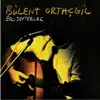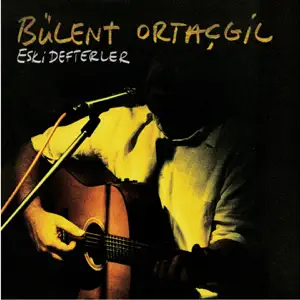


CIUDAD NATAL
Ankara, Turkey
NACIMIENTO
1 de marzo de 1950
Acerca de Bülent Ortaçgil
Admittedly one of the best Turkish songwriters, Bülent Ortaçgil is the life jacket for the intellectual music listener. Over the years, getting more and more upset at being thought of as making peaceful songs, he combined his acoustic creations with his deeply thought, multi-layered critical lyrics and recorded with some of the best musicians in the country. Although his albums never come close to selling like the popular artists and he never sells out gigs, his timeless albums continue to be reissued in small numbers and occupy a revered place in every Turkish music lover's collection.
Ortaçgil was born in March 1, 1950 in the capital city of Turkey, Ankara. Born in the city, his family later moved to Istanbul, where he would enjoy his education as well as his musical development. Throughout his high-school years he showed a strong interest in the fine arts. He acted in school plays and tried to play the drums, but ended up playing the guitar in concession. He shared the same corridors with Mazhar Alanson -- later a famous member of MFO -- and a group of soon-to-be musician friends. Unlike his peers, however, he didn't want to become a rock star. Known to be a quiet and hard-working student, he kept playing his acoustic guitar. Later, while his friend Ahmet Güvenç was recording with his band Bunalim, he was offered the opportunity to record a single during their session. His first single was recorded in 1971 and consisted of "Anlamsiz" b/w "Yuzunu Dokme Kucuk Kiz."
In 1974, while studying chemistry at the university, he recorded his debut album, Benimle Oynar Misin ("Will You Play with Me"). It didn't sell millions or top the charts, but it was later appreciated as one of the best albums ever recorded by a Turkish pop artist. It didn't have any Turkish folk themes like every other record in those days, but it also wasn't a rip-off of what was going on around the world. Vastly unique and truly sensitive, even after years passed, Benimle Oynar Misin remains fresh, with instantly classic songs like "Olmali Mi Olmamali Mi," "Benimle Oynar Misin," and "Sen Varsin." The artist also showed the first hints of his favorite subject with the album, the concept of "playing games." That debut album marked the beginning of the end, however, when Ortaçgil had to choose whether to become an artist or an engineer. He went on with the second, later regretting his choice since he could have written more good songs in his time spent studying engineering. Although he said he never believed he could earn money from music, he teamed up with musician Fikret Kizilok to form an art house called Cekirdek Sanatevi in 1981, a center for like-minded musicians where lvie sessions were recorded and hand-copied while the art works were hand-drawn and colored. Ruzgara Soylenen Sarkilar and Biz Sarkilarimizi were the fruits of those times, while his first major album, combining the talents of Ortaçgil and Kizilok, was 1986's Pencere Önü Çiçegi ("The Windowsill Flower").
Although Ortaçgil shared a similar musical tastes with Kizilok, they parted ways after 16 years and Ortaçgil decided to concentrate solely on music. His second solo effort, 2. Perde, ("Second Act"), was recorded in 1990 and produced by Onno Tunc, who had also produced his first album. With more of an '80s synth pop sound, this second album was far from the acoustic recipe of his legendary debut album, but it retained the same songwriting quality: "Sicak," "Ciglik Cigliga," "Bu Is Cok Zor Yonca," and "Bozburun" in particular showed the clear genius behind these songs. The third Ortaçgil album reflected what his future was going to sound like. He joined forces with bandmates Erkan Ogur (fretless guitar), Gurol Agríbas (bass), and Cem Aksel (drums). 1991's Oyuna Devam ("Carry on with the Game") features -- in addition to Ortaçgil's lyrics -- guitar solos from one of the most talented Turkish guitarists, cleverly timed drums, and strong bass playing. From that point on, Ortaçgil started publishing new albums every three or four years. 1994 saw him departing from his standard line of recording and songwriting. Büyükler Icin Cocuk Sarkilari ("These Songs Won't Do Any Good"), was harder, heavier,and more complicated than its predecessors. And for the first time, an Ortaçgil album had vocal effects. In 1998, he recorded Light which is thought to be his best work by the majority of his fans, aside from his landmark debut, of course. Ortaçgil, who had preferred to disguise his messages via the layers of his lyrics up to that point, chose to spell out his social criticism more clearly and loudly with Light.
1999's Eski Defterler ("Old Books") should be seen as a reinterpretation rather than a best-of album. Believing that songs are living organisms, Ortaçgil re-recorded his pre-'90s songs, reinterpreting them to show what they've come to mean to him over the years. In 2000, first decent tribute album for a Turkish artist was recorded in his name. The album contained cover versions of Ortaçgil songs from 22 Turkish artists with different backgrounds. These artists varied from popular rock acts like Bulutsuzluk Özlemi, Mor Ve Ötesi, and Sebne Ferah to pop diva Sezen Aksu and jazz queen Yîldîz Ibrahimova. Ortaçgil recorded his own studio album in 2003. For Gece Yalanlari ("Night Lies") he recruited a string quartet aside from his classic lineup. In 2007, he released two albums: a live recording of his collaborations with pop act Teoman, and Buyukler Icin Cocuk Sarkilari ("Children's Songs for Grown-Ups"), which features his work with Fikret Kizilok from the '80s when the two recorded children's songs for a TV program. Bülent Ortaçgil lives half of the year in Bozburun -- a coastal village -- and the rest in Istanbul where he performs live time to time. ~ Vefik Karaege
Ortaçgil was born in March 1, 1950 in the capital city of Turkey, Ankara. Born in the city, his family later moved to Istanbul, where he would enjoy his education as well as his musical development. Throughout his high-school years he showed a strong interest in the fine arts. He acted in school plays and tried to play the drums, but ended up playing the guitar in concession. He shared the same corridors with Mazhar Alanson -- later a famous member of MFO -- and a group of soon-to-be musician friends. Unlike his peers, however, he didn't want to become a rock star. Known to be a quiet and hard-working student, he kept playing his acoustic guitar. Later, while his friend Ahmet Güvenç was recording with his band Bunalim, he was offered the opportunity to record a single during their session. His first single was recorded in 1971 and consisted of "Anlamsiz" b/w "Yuzunu Dokme Kucuk Kiz."
In 1974, while studying chemistry at the university, he recorded his debut album, Benimle Oynar Misin ("Will You Play with Me"). It didn't sell millions or top the charts, but it was later appreciated as one of the best albums ever recorded by a Turkish pop artist. It didn't have any Turkish folk themes like every other record in those days, but it also wasn't a rip-off of what was going on around the world. Vastly unique and truly sensitive, even after years passed, Benimle Oynar Misin remains fresh, with instantly classic songs like "Olmali Mi Olmamali Mi," "Benimle Oynar Misin," and "Sen Varsin." The artist also showed the first hints of his favorite subject with the album, the concept of "playing games." That debut album marked the beginning of the end, however, when Ortaçgil had to choose whether to become an artist or an engineer. He went on with the second, later regretting his choice since he could have written more good songs in his time spent studying engineering. Although he said he never believed he could earn money from music, he teamed up with musician Fikret Kizilok to form an art house called Cekirdek Sanatevi in 1981, a center for like-minded musicians where lvie sessions were recorded and hand-copied while the art works were hand-drawn and colored. Ruzgara Soylenen Sarkilar and Biz Sarkilarimizi were the fruits of those times, while his first major album, combining the talents of Ortaçgil and Kizilok, was 1986's Pencere Önü Çiçegi ("The Windowsill Flower").
Although Ortaçgil shared a similar musical tastes with Kizilok, they parted ways after 16 years and Ortaçgil decided to concentrate solely on music. His second solo effort, 2. Perde, ("Second Act"), was recorded in 1990 and produced by Onno Tunc, who had also produced his first album. With more of an '80s synth pop sound, this second album was far from the acoustic recipe of his legendary debut album, but it retained the same songwriting quality: "Sicak," "Ciglik Cigliga," "Bu Is Cok Zor Yonca," and "Bozburun" in particular showed the clear genius behind these songs. The third Ortaçgil album reflected what his future was going to sound like. He joined forces with bandmates Erkan Ogur (fretless guitar), Gurol Agríbas (bass), and Cem Aksel (drums). 1991's Oyuna Devam ("Carry on with the Game") features -- in addition to Ortaçgil's lyrics -- guitar solos from one of the most talented Turkish guitarists, cleverly timed drums, and strong bass playing. From that point on, Ortaçgil started publishing new albums every three or four years. 1994 saw him departing from his standard line of recording and songwriting. Büyükler Icin Cocuk Sarkilari ("These Songs Won't Do Any Good"), was harder, heavier,and more complicated than its predecessors. And for the first time, an Ortaçgil album had vocal effects. In 1998, he recorded Light which is thought to be his best work by the majority of his fans, aside from his landmark debut, of course. Ortaçgil, who had preferred to disguise his messages via the layers of his lyrics up to that point, chose to spell out his social criticism more clearly and loudly with Light.
1999's Eski Defterler ("Old Books") should be seen as a reinterpretation rather than a best-of album. Believing that songs are living organisms, Ortaçgil re-recorded his pre-'90s songs, reinterpreting them to show what they've come to mean to him over the years. In 2000, first decent tribute album for a Turkish artist was recorded in his name. The album contained cover versions of Ortaçgil songs from 22 Turkish artists with different backgrounds. These artists varied from popular rock acts like Bulutsuzluk Özlemi, Mor Ve Ötesi, and Sebne Ferah to pop diva Sezen Aksu and jazz queen Yîldîz Ibrahimova. Ortaçgil recorded his own studio album in 2003. For Gece Yalanlari ("Night Lies") he recruited a string quartet aside from his classic lineup. In 2007, he released two albums: a live recording of his collaborations with pop act Teoman, and Buyukler Icin Cocuk Sarkilari ("Children's Songs for Grown-Ups"), which features his work with Fikret Kizilok from the '80s when the two recorded children's songs for a TV program. Bülent Ortaçgil lives half of the year in Bozburun -- a coastal village -- and the rest in Istanbul where he performs live time to time. ~ Vefik Karaege
Canciones más vistas de
Bülent Ortaçgil en Abril
Top Artistas
Nosotros
Notas
